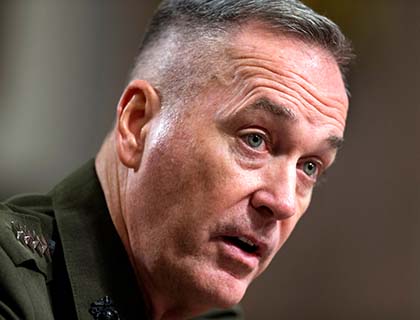General Joseph Dunford, commander of the International Security Assistance Force (ISAF) and U.S. Forces in Afghanistan, spoke out again on Sunday to emphasize the importance of signing the Bilateral Security Agreement (BSA) as quickly as possible in order to prepare for the coming changes to the Afghan security landscape and reaffirm the international community's commitment to Afghanistan.
"There is no doubt that the bilateral security agreement is going to send a clear message first and foremost to the Afghan people and Afghan security forces and enhance their confidence to deal with the challenges that we will have to deal with collectively in the coming months," Gen. Dunford said.
In addition, the top U.S. commander in Afghanistan affirmed that a BSA agreement would speak volumes to those who wish to cause instability in Afghanistan. "The BSA will also send a loud and clear signal to regional actors and they will know also that the U.S. and international community is going to remain committed to a stable, peaceful and unified Afghanistan, and I also think the BSA will send a message to the Taliban that they can't wait us out," he said.
BSA talks were suspended by President Karzai after the Taliban's office was opened in Qatar back in June. The group naming its office "the Islamic Emirate of Afghanistan" angered President Karzai – who largely blamed the fiasco on the U.S. – enough to freeze negotiations until the Taliban agreed to speak to the High Peace Council (HPC). Nevertheless, recently circulating reports and U.S. officials like Secretary of State John Kerry have indicated that a final agreement on the BSA between Washington and Kabul maybe on the horizon.
To this point some of the more contentious issues slowing down the negotiation process have included: the number of U.S. soldiers that will remain in Afghanistan, the level of financial aid and technical support assured by the international community and the question of whether or not U.S. soldiers will receive immunity from prosecution in Afghan courts.
Mohammad Amin Farhang, the former Afghan Minister of Commerce, has said that both sides would have to compromise on certain things in order to reach an agreement. He stressed that stalling the entire process is not a solution to anything and would only make its implementation more difficult.
When U.S. officials announced an "October deadline" for signing the BSA in late July, President Karzai's government made it clear that it would not abide by any deadline as it was more concerned with the contents of the agreement than its timing. President Karzai added that once the U.S. accepts all conditions set out by his government and makes necessary changes, he will sign the BSA.
"No country signs an agreement without reviewing its benefits. The US should accept the demands put front by Afghanistan," said Janan Mosazai, spokesman of the Ministry of Foreign Affairs (MoFA), on Sunday.
Some political commentators have suggested that the U.S. is pushing the Afghan government to sign the agreement before the election campaigns begin in hopes of keeping the agreement from being used as a tool by candidates.
President Karzai, for his part, has already been accused by Afghan MPs for using the BSA for political gain by saying in July that the fate of the BSA would be decided by a "Loya Jirga." The MPs said President Karzai hoped to gain influence for himself in post-2014 Afghanistan, despite his term as President being brought to an end.
Regardless of the rhetoric and political maneuvering on either side of the agreement, however, if there is one thing that all agree on it is that some sort of BSA is needed to ensure a smooth transition and secure Afghanistan after 2014. If no agreement is signed, it is unlikely that any U.S. forces will remain in Afghanistan after 2014 and the rumors spread in July of the U.S. taking a "zero option" will come to fruition.
And that seems to be exactly what Gen. Dunford wants to avoid.
"The thing that is most important right now is the confidence of the Afghan people, the confidence of the Afghan security forces and trying to ensure that they know we are committed now and into the future, that we will finish what we started in terms of developing the (Afghan forces) and that more broadly the international community will stand with Afghanistan into the decade of opportunity, 2015 and beyond," Dunford said. (Tolo News)

